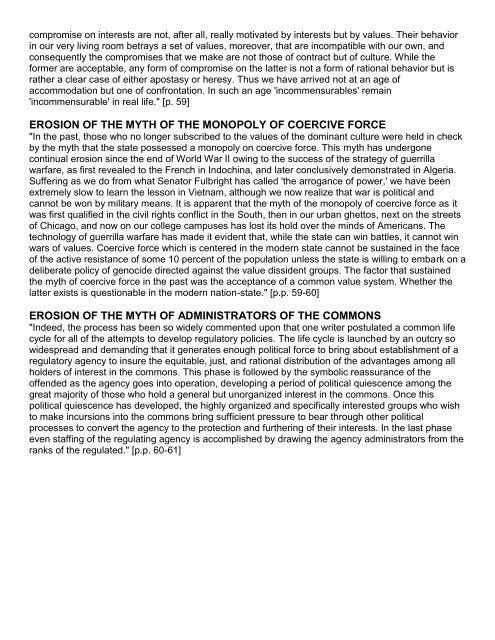The Tragedy of the Commons What Shall We Maximize?
The Tragedy of the Commons What Shall We Maximize?
The Tragedy of the Commons What Shall We Maximize?
You also want an ePaper? Increase the reach of your titles
YUMPU automatically turns print PDFs into web optimized ePapers that Google loves.
compromise on interests are not, after all, really motivated by interests but by values. <strong>The</strong>ir behaviorin our very living room betrays a set <strong>of</strong> values, moreover, that are incompatible with our own, andconsequently <strong>the</strong> compromises that we make are not those <strong>of</strong> contract but <strong>of</strong> culture. While <strong>the</strong>former are acceptable, any form <strong>of</strong> compromise on <strong>the</strong> latter is not a form <strong>of</strong> rational behavior but isra<strong>the</strong>r a clear case <strong>of</strong> ei<strong>the</strong>r apostasy or heresy. Thus we have arrived not at an age <strong>of</strong>accommodation but one <strong>of</strong> confrontation. In such an age 'incommensurables' remain'incommensurable' in real life." [p. 59]EROSION OF THE MYTH OF THE MONOPOLY OF COERCIVE FORCE"In <strong>the</strong> past, those who no longer subscribed to <strong>the</strong> values <strong>of</strong> <strong>the</strong> dominant culture were held in checkby <strong>the</strong> myth that <strong>the</strong> state possessed a monopoly on coercive force. This myth has undergonecontinual erosion since <strong>the</strong> end <strong>of</strong> World War II owing to <strong>the</strong> success <strong>of</strong> <strong>the</strong> strategy <strong>of</strong> guerrillawarfare, as first revealed to <strong>the</strong> French in Indochina, and later conclusively demonstrated in Algeria.Suffering as we do from what Senator Fulbright has called '<strong>the</strong> arrogance <strong>of</strong> power,' we have beenextremely slow to learn <strong>the</strong> lesson in Vietnam, although we now realize that war is political andcannot be won by military means. It is apparent that <strong>the</strong> myth <strong>of</strong> <strong>the</strong> monopoly <strong>of</strong> coercive force as itwas first qualified in <strong>the</strong> civil rights conflict in <strong>the</strong> South, <strong>the</strong>n in our urban ghettos, next on <strong>the</strong> streets<strong>of</strong> Chicago, and now on our college campuses has lost its hold over <strong>the</strong> minds <strong>of</strong> Americans. <strong>The</strong>technology <strong>of</strong> guerrilla warfare has made it evident that, while <strong>the</strong> state can win battles, it cannot winwars <strong>of</strong> values. Coercive force which is centered in <strong>the</strong> modern state cannot be sustained in <strong>the</strong> face<strong>of</strong> <strong>the</strong> active resistance <strong>of</strong> some 10 percent <strong>of</strong> <strong>the</strong> population unless <strong>the</strong> state is willing to embark on adeliberate policy <strong>of</strong> genocide directed against <strong>the</strong> value dissident groups. <strong>The</strong> factor that sustained<strong>the</strong> myth <strong>of</strong> coercive force in <strong>the</strong> past was <strong>the</strong> acceptance <strong>of</strong> a common value system. Whe<strong>the</strong>r <strong>the</strong>latter exists is questionable in <strong>the</strong> modern nation-state." [p.p. 59-60]EROSION OF THE MYTH OF ADMINISTRATORS OF THE COMMONS"Indeed, <strong>the</strong> process has been so widely commented upon that one writer postulated a common lifecycle for all <strong>of</strong> <strong>the</strong> attempts to develop regulatory policies. <strong>The</strong> life cycle is launched by an outcry sowidespread and demanding that it generates enough political force to bring about establishment <strong>of</strong> aregulatory agency to insure <strong>the</strong> equitable, just, and rational distribution <strong>of</strong> <strong>the</strong> advantages among allholders <strong>of</strong> interest in <strong>the</strong> commons. This phase is followed by <strong>the</strong> symbolic reassurance <strong>of</strong> <strong>the</strong><strong>of</strong>fended as <strong>the</strong> agency goes into operation, developing a period <strong>of</strong> political quiescence among <strong>the</strong>great majority <strong>of</strong> those who hold a general but unorganized interest in <strong>the</strong> commons. Once thispolitical quiescence has developed, <strong>the</strong> highly organized and specifically interested groups who wishto make incursions into <strong>the</strong> commons bring sufficient pressure to bear through o<strong>the</strong>r politicalprocesses to convert <strong>the</strong> agency to <strong>the</strong> protection and fur<strong>the</strong>ring <strong>of</strong> <strong>the</strong>ir interests. In <strong>the</strong> last phaseeven staffing <strong>of</strong> <strong>the</strong> regulating agency is accomplished by drawing <strong>the</strong> agency administrators from <strong>the</strong>ranks <strong>of</strong> <strong>the</strong> regulated." [p.p. 60-61]






